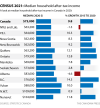Canadian incomes went up in 2020 amid uptake of pandemic benefits: census data
Advertisement
Read this article for free:
or
Already have an account? Log in here »
To continue reading, please subscribe:
Monthly Digital Subscription
$0 for the first 4 weeks*
- Enjoy unlimited reading on winnipegfreepress.com
- Read the E-Edition, our digital replica newspaper
- Access News Break, our award-winning app
- Play interactive puzzles
*No charge for 4 weeks then price increases to the regular rate of $19.95 plus GST every four weeks. Offer available to new and qualified returning subscribers only. Cancel any time.
Monthly Digital Subscription
$4.99/week*
- Enjoy unlimited reading on winnipegfreepress.com
- Read the E-Edition, our digital replica newspaper
- Access News Break, our award-winning app
- Play interactive puzzles
*Billed as $19.95 plus GST every four weeks. Cancel any time.
To continue reading, please subscribe:
Add Free Press access to your Brandon Sun subscription for only an additional
$1 for the first 4 weeks*
*Your next subscription payment will increase by $1.00 and you will be charged $16.99 plus GST for four weeks. After four weeks, your payment will increase to $23.99 plus GST every four weeks.
Read unlimited articles for free today:
or
Already have an account? Log in here »
Hey there, time traveller!
This article was published 13/07/2022 (1272 days ago), so information in it may no longer be current.
OTTAWA – Canadian incomes trended higher in 2020 everywhere except in Alberta and Newfoundland and Labrador, as millions benefited from pandemic supports, according to new census data from Statistics Canada.
The agency reports that median after-tax household income was $73,000 in 2020, up 9.8 per cent compared to its last national survey five years earlier, partly driven by the losses of lower-paying jobs.
Despite fewer Canadians receiving employment income during the pandemic, census data suggest job losses were partly offset by COVID-19 benefits as about two-thirds of Canadian adults received payments from relief programs.

The number of Canadians earning less than $20,000 grew by more than 415,000 as many lower-paid jobs disappeared.
But the low-income rate fell overall and the number of Canadians who reported no income shrank by nearly a million compared to 2019.
Experts had cautioned that the income data, which is based on Canada Revenue Agency tax and benefits records, would form a complicated picture of the early pandemic and should be seen as a snapshot in time.
This report by The Canadian Press was first published July 13, 2022.






